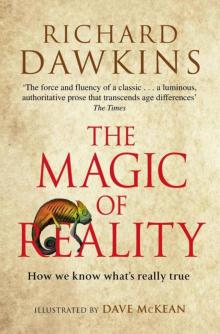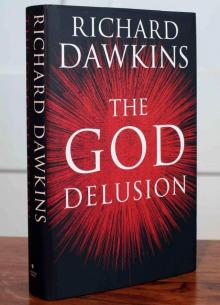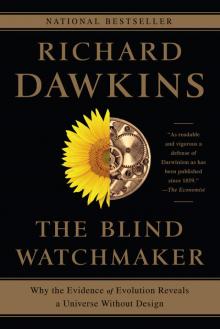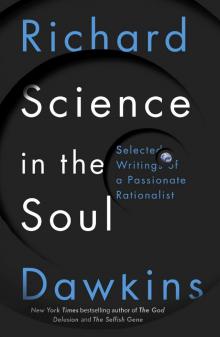- Home
- Richard Dawkins
Outgrowing God Page 2
Outgrowing God Read online
Page 2
How much of what we read in the Bible is true?
How do we know anything in history really happened? How do we know Julius Caesar existed? Or William the Conqueror? No eye-witnesses survive; and even eye-witnesses can be surprisingly unreliable, as any police officer collecting statements will tell you. We know that Caesar and William existed, because archaeologists have found tell-tale relics and because there’s lots of confirmation from documents written when they were alive. But when the only evidence for an event or person wasn’t written down until decades or centuries after the death of any witnesses, historians get suspicious. The evidence is weak because it was passed on by word of mouth and could easily become distorted. Especially if the writer was biased. Winston Churchill said: ‘History will be kind to me. I intend to write it!’ We’ll see in this chapter that there are problems with most of the stories about Jesus in the New Testament. The Old Testament must wait till Chapter 3.
Jesus would have spoken Aramaic, a Semitic language related to Hebrew. The books of the New Testament were originally written in Greek; those of the Old Testament in Hebrew. Many English translations exist. The most famous is the King James version of 1611, so called because it was commissioned by King James I of England (James VI of Scotland). The King James version is the translation I prefer because the language is beautiful – not surprisingly, since its English is the English of Shakespeare’s time. However, because that language is not always so clear to modern readers, in this book I have reluctantly decided to use a modern translation, the New International version; quotations are from the latter unless otherwise stated.
There’s a party game called Chinese Whispers (in Britain) or Telephone (in America). You line up, say, ten people in a row. The first person whispers something – it might be a story – to the second. The second whispers the story to the third, the third person to the fourth, and so on. Finally, when the story reaches the tenth person she repeats what she has heard to the whole party. Unless the original story was exceptionally simple and brief, it will have become greatly changed, often in a funny way. It’s not just the words that change down the line, but important details of the story itself.
Before writing was invented and before scientific archaeology started, word-of-mouth storytelling, with all its Chinese Whispery distortions, was the only way people learned about history. And it’s terribly unreliable. As each generation of storytellers gives way to the next, the story becomes more and more garbled. Eventually, history – what actually happened – becomes lost in myth and legend. It’s difficult to know whether there ever was a real person behind the legendary Greek hero Achilles, or the fabled beauty Helen whose face ‘launched a thousand ships’. When the poet Homer finally wrote the stories down (and we don’t know when that was, even to the nearest century) they’d been distorted through generations of word-of-mouth retelling. Any reliable truth had dissolved away. We don’t know who ‘Homer’ was or when he lived; whether he was blind, as legend has it; whether he was one person or many. And we don’t know how his stories originally began, before they passed through the distorting filter of word-of-mouth retelling. Did they start as factual accounts and then become garbled? Or did they start as made-up fiction and get changed in the retelling?
The same applies to the stories in the Old Testament. We have no more reason to believe them than we do Homer’s stories about Achilles or Helen. The stories of Abraham and Joseph are Hebrew legends, just as Homer’s are Greek legends. How about the New Testament? It offers a better hope of finding true history because it refers to a more recent period than the Old: a mere two thousand years ago. But how much do we really know about Jesus? Can we be sure he even existed? Most, though not all, modern scholars think he probably did. What evidence do we have?
The gospels? They’re printed at the beginning of the New Testament, so you might think they were written first. Actually, the oldest books in the New Testament come near the end: the letters of St Paul. Unfortunately, Paul says hardly anything about Jesus’s life. There’s lots about the religious meaning of Jesus, especially his death and resurrection. But almost nothing that even claims to be history. Maybe Paul thought his readers already knew the story of Jesus’s life. But it’s possible Paul didn’t know it himself: remember, the gospels were not yet written. Or maybe he didn’t think it was even important. This lack of facts about Jesus in Paul’s letters makes historians wonder. Isn’t it a little odd that Paul, who wanted people to worship Jesus, says almost nothing about what Jesus actually said or did?
Another thing that worries historians is that there are hardly any mentions of Jesus in histories outside the gospels. The Jewish historian Josephus (AD 37–C.100), writing in Greek, had only this to say:
About this time there lived Jesus, a wise man, if indeed one ought to call him a man. For he was one who performed surprising deeds and was a teacher of such people as accept the truth gladly. He won over many Jews and many of the Greeks. He was the Messiah. And when, upon the accusation of the principal men among us, Pilate had condemned him to a cross, those who had first come to love him did not cease. He appeared to them spending a third day restored to life, for the prophets of God had foretold these things and a thousand other marvels about him. And the tribe of the Christians, so called after him, has still to this day not disappeared.
Many historians suspect this passage is a forgery, stuck in later by a Christian writer. The most suspicious phrase is ‘He was the Messiah.’ In the Jewish tradition, ‘Messiah’ was the name given to the long-promised Jewish king or military leader who would be born to triumph over the enemies of the Jews. Christians taught that Jesus was the Messiah (‘Christ’ is simply the Greek translation of this word). But to a devout Jew, Jesus didn’t look at all like a military leader. In fact, that’s putting it mildly. His message of peace – even turning the other cheek when somebody hits you – is not what we expect of a soldier. And far from leading the Jews against the Roman oppressors of his time, Jesus went meekly to his execution at their hands. The idea that Jesus was the Messiah would have seemed pretty bonkers to a devout Jew like Josephus. If Josephus had somehow gone against his whole upbringing and convinced himself that so unlikely a character as Jesus was the Messiah, he would have made a big song and dance of it. He wouldn’t have just dropped in a casual ‘He was the Messiah’. It does sound very like a later Christian forgery. That’s certainly what most scholars now believe.
The only other early historian who mentions Jesus is the Roman Tacitus (AD 54–120). His writing offers more convincing evidence for Jesus’s existence, for the backhanded reason that Tacitus has nothing good to say about Christians. Writing in Latin about an event during the persecution of the early Christians by the Emperor Nero (AD 37–87), Tacitus said:
Nero fastened the guilt and inflicted the most exquisite tortures on a class hated for their abominations, called Christians by the populace. Christus, from whom the name had its origin, suffered the extreme penalty during the reign of Tiberius at the hands of one of our procurators, Pontius Pilatus, and a most mischievous superstition, thus checked for the moment, again broke out not only in Judæa, the first source of the evil, but even in Rome, where all things hideous and shameful from every part of the world find their centre and become popular.
No later insertion by Christians here!
The balance of probability, according to most but not all scholars, suggests that Jesus did exist. Of course we’d know for sure, if we could be certain the four gospels of the New Testament were historically true. Until recently, nobody doubted them. There’s even a proverbial phrase in English, ‘gospel truth’, meaning as true as true can be. But that phrase rings rather hollow today, after studies in the nineteenth and twentieth centuries by (especially German) scholars.
Who wrote the gospels? And when? Many people wrongly believe that the gospel of ‘Matthew’ was written by Matthew the tax-collector, one of Jesus’s twelve close companions. And that the go
spel of ‘John’ was written by another of that small group, the John who came to be known as ‘the beloved disciple’. They think ‘Mark’ was written by a young companion of Jesus’s chief disciple Peter, and ‘Luke’ by a doctor friend of Paul. But nobody has the faintest idea who really wrote the gospels. We have no convincing evidence in any of the four cases. Later Christians simply stuck a name on the top of each gospel for convenience. It must have seemed better than giving them dull, neutral labels like A, B, C and D. No serious scholar today thinks the gospels were written by eye-witnesses, and all agree that even Mark, the oldest of the four gospels, was written about 35 or 40 years after the death of Jesus. Luke and Matthew derived most of their stories from Mark, plus some from a lost Greek document known as ‘Q’. Everything that is in the gospels suffered from decades of word-of-mouth retelling, Chinese-Whispery distortion and exaggeration before those four texts were finally written down.
The assassination of President Kennedy in 1963 was witnessed by hundreds of people. It’s on film. Newspapers around the world reported it the very same day. A committee called the Warren Commission was set up to examine every detail of what happened. It took expert advice from scientists, doctors, forensic detectives and fire-arms experts. The 888-page Warren Report concluded that Kennedy was shot by Lee Harvey Oswald, acting alone. But over the years myths and legends and conspiracy theories have arisen, and they’ll probably grow with the telling long after all the eye-witnesses are dead.
The ‘9/11’ attacks on New York and Washington DC took place less than 20 years ago, a shorter time than elapsed between the death of Jesus and the writing of the oldest gospel, Mark. The facts of 9/11 have been massively documented, reported by multiple witnesses and chewed over in minute detail ever since. Yet they are not agreed. The internet is abuzz with contradictory rumours, legends and theories. Some people think it was an American plot. Or an Israeli plot. Even a plot by aliens from outer space. Others at the time thought, with no evidence, that it was masterminded by Saddam Hussein, dictator of Iraq. This justified, in their eyes, President Bush’s invasion of that country (though that was never the official reason). Eye-witnesses photographed what they thought was the face of Satan in the smoky dust clouds hanging over New York that day.
It’s unfortunately true – and the internet brings it home as never before – that people simply make stuff up. And rumours and gossip spread like epidemics, regardless of truth. The great American author Mark Twain is supposed to have said: ‘A lie can spread half way around the world while the truth is putting on its shoes.’ And not only malicious lies, but good stories that aren’t true but are amusing and fun to recount, especially if you were told them in good faith and don’t positively know they’re untrue. Or stories that, if not amusing, are spookily uncanny – another reason why so many are passed on.
Here’s a typical example of how an untrue story spreads because it’s entertaining and fits with people’s expectations or prejudices. First some background. You may have heard of ‘the Rapture’. Some preachers and writers, drawing on particular passages in the Bible, have recently revved up thousands of people, mostly in America, to believe that soon a few lucky ones, chosen for their goodness, will suddenly shoot up into the sky and disappear into heaven. This ‘Rapture’ will herald the promised ‘Second Coming’ of Jesus. The rest of us – unraptured – will be ‘Left Behind’. People we know will suddenly vanish without trace. Presumably ‘up into the sky’ means that raptured Australians will shoot in the opposite direction from raptured Europeans!
Now here’s the story I mentioned. It isn’t true but it’s widely believed, and it shows how a good story will spread. A woman from Arkansas was driving behind a truck carrying a load of life-sized human-shaped balloons. The truck crashed and the pink inflated dolls floated skywards because they’d been inflated with helium. Thinking she was witnessing the Rapture and the Second Coming of Jesus, the woman screamed, ‘He’s back, he’s back!’ and climbed out through the sunroof of her moving car, in order to be raptured up to heaven. The resulting 20-car pile-up killed 13 innocent people as well as the woman herself. Note the spurious precision of that ‘13 innocent people’. You might think that a mere rumour wouldn’t specify such detail. But you’d be wrong.
And you can see how ‘spreadable’ that story is. If somebody told it to you as fact, you’d almost certainly rush to tell somebody else. Stories spread just because they’re good stories. Perhaps they’re funny. Perhaps we bask in the attention we get when we pass on a good story. The story of the helium dolls is not only wildly vivid: it chimes with people’s expectations or prejudices. Can you see how the same might have been true of stories of Jesus’s miracles or his resurrection? Early recruits to the young religion of Christianity might have been especially eager to pass on stories and rumours about Jesus, without checking them for truth.
Think of the distorted legends about 9/11 or the death of Kennedy, and then imagine how even more easily and thoroughly things could have been distorted if there had been no cameras, no newspapers, nothing written down for 30 years after the event. Nothing to go on but word-of-mouth gossip. That was the situation after the death of Jesus. All around the eastern Mediterranean, from Palestine to Rome, there were isolated pockets of Christians of various kinds. Communications between these local groups were poor and infrequent. The gospels were not yet written. They had no New Testament to bind them together. They disagreed on many things, for example whether Christians had to be Jews (and had to be circumcised) or whether Christianity was a whole new religion. Some of Paul’s letters show a leader struggling to bring order to this chaos.
An agreed biblical ‘canon’ – those books agreed as the official list – wasn’t finally settled until centuries after Paul’s death. The Bible read by (Protestant) Christians today is a standard canon of 27 books in the New Testament and 39 books in the Old Testament (Roman Catholic and Orthodox Christians have a set of additional books, often called the ‘Apocrypha’).
Matthew, Mark, Luke and John are the only gospels in the official canon but, as we’ll see, plenty of other gospels of Jesus had been written around the same time. The canon was largely fixed in AD 325 by a conference of church leaders called the Council of Nicaea, set up by the Roman Emperor Constantine – the one whose conversion led to Europe becoming Christian. He made Christianity the official religion of the Roman Empire. But for Constantine, you’d probably have been brought up to worship Jupiter, Apollo, Minerva and the other Roman gods. Much later, Christianity was spread across South America by another couple of great empires, the Portuguese Empire (in Brazil) and the Spanish Empire (in the rest of the continent). The widespread presence of Islam in North Africa, the Middle East and the Indian subcontinent is also the result of military conquest.
As I said, Matthew, Mark, Luke and John were only four out of a large number of gospels doing the rounds at the time of the Council of Nicaea. I’ll come on to some of the lesser-known gospels in a moment. Any of them could have been included in the canon, but for various reasons none of them made it. Often it was because they were judged heretical, which just means they said things at odds with the ‘orthodox’ beliefs of council members. Partly it was because they were written slightly more recently than Matthew, Mark, Luke and John. But, as we’ve seen, even Mark wasn’t written early enough to be potentially reliable history.
The favoured four gospels were chosen, in part, for weird reasons which owe more to poetic fancy than to history. Irenaeus, one of those influential figures in the early history of Christianity known as the ‘Fathers of the Church’, lived a century before the Council of Nicaea. He was convinced that there had to be four gospels, no more and no fewer. He pointed out (as though it mattered) that there are four corners of the earth and four winds. As if that wasn’t enough, he also pointed out that the Book of Revelation refers to God’s throne being borne by four creatures with four faces. This seems to have been inspired by the Old Testament prophet Ezek
iel, who dreamed of four creatures coming out of a whirlwind, each one of which had four faces. Four, four, four, four, you can’t get away from four, we obviously have to have four gospels in the canon! I’m sorry to say that’s the kind of ‘reasoning’ that passes for logic in theology.
The Book of Revelation, by the way, wasn’t added to the canon until a century later and it’s a pity it ever was. Some guy called John had a weird dream one night on an island called Patmos, and he wrote it down. We all have dreams, and many of them are pretty weird. Mine almost always are, but I don’t write them down and I certainly don’t think they’re interesting enough to inflict upon other people. John’s dream was weirder than most (almost as though he was on drugs). It has become hugely influential simply because it somehow got itself included in the biblical canon. It’s thought to be prophetic and is often quoted by fiery preachers in America. Along with Paul’s first letter to the Thessalonians, Revelation is the main inspiration for the idea of ‘the Rapture’. It is also the source of the dangerous idea that the longed-for Second Coming of Jesus cannot happen until after the ‘Battle of Armageddon’. This belief is why some people in America long for an all-out war involving Israel in the Middle East. They think that war will be ‘Armageddon’.
Thousands of people, especially in America since the remarkable popularity of the so-called ‘Left Behind’ books, sincerely hold the nutty belief that the Rapture is really going to happen. And happen soon. There are even websites that advertise a paid service to look after your pet cat in the event that you are, without warning, hoisted bodily ‘up’ to heaven. It’s a shame people don’t realize it was little more than chance which books got included in the canon and which books were…left behind!

 The Magic of Reality
The Magic of Reality The Extended Phenotype
The Extended Phenotype The God Delusion
The God Delusion The Selfish Gene
The Selfish Gene The Blind Watchmaker
The Blind Watchmaker The Greatest Show on Earth
The Greatest Show on Earth Climbing Mount Improbable
Climbing Mount Improbable Outgrowing God
Outgrowing God Brief Candle in the Dark
Brief Candle in the Dark The Greatest Show on Earth: The Evidence for Evolution
The Greatest Show on Earth: The Evidence for Evolution Science in the Soul
Science in the Soul An Appetite for Wonder
An Appetite for Wonder